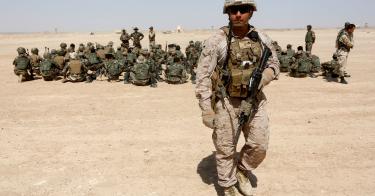As President Donald Trump contemplates the next steps for the U.S. in Afghanistan, it is time to inject a dose of realism into what the U.S. mission is there and what America’s goals should be.
For too long, many of our policymakers have explained the U.S. mission in Afghanistan in terms of nation-building or building democracy.
Consequently, these lofty, and impossible, goals have distracted from the real reason why the U.S. went into Afghanistan in 2001 and why we should remain there in 2017: national security.
The stakes in Afghanistan are high. Although al-Qaeda’s presence in Afghanistan is a shadow of its former self, new actors like the ISIS-Khorasan (ISIS-K) are making advances.
As the commander of U.S. forces in Afghanistan, Gen. John Nicholson, recently told Congress, the border region between Afghanistan and Pakistan is home to 20 of the world’s 98 U.S.-designated terror groups. There are now reports of Russia providing the Taliban with arms and training.
As Trump decides on what to do in Afghanistan, he should make clear that America’s goal is to get Afghanistan to the point where it can manage its own domestic security. Nothing more, nothing less.
To achieve this goal, the U.S. mission in Afghanistan does not have to be—and should not be—a full-blown, American-led counterinsurgency campaign involving 150,000 U.S. and NATO troops.
Instead, the U.S. focus should remain on training, advising, and assisting the Afghan forces. This is why the reported troop increase of 3,000-4,000 to help with these goals seems reasonable and responsible.
Ultimately, it is the Afghans’ country and their war. We are not there to fight for them, but to help them fight and win.
We must not let the Taliban return to complete power in Afghanistan. We went to Afghanistan in the first place because it’s the place where Osama bin Laden hatched the 9/11 attacks.
If America walks away, the Taliban will likely return—if not to complete power, then surely over much of the country.
Complicating matters is the arrival of groups like ISIS-Khorasan onto the scene. As ISIS gets squeezed in Syria and Iraq, its franchises will be looking to increase its presence elsewhere.
Leaving the Afghans high and dry would be a disastrous repeat of the 1990s and would mean all the U.S. sacrifice in blood and treasure would have been for nothing.
We would have returned to the same situation that required the intervention in the first place—failing to learn the lesson of the 1990s.
During those years, The Heritage Foundation lamented the Clinton administration’s neglect of Afghanistan that led to the rise of the Taliban.
Our senior fellow for the Middle East, Jim Phillips, warned about the dangers emanating from Afghanistan in his paper “Defusing Terrorism at Ground Zero: Why a New U.S. Policy is Needed for Afghanistan,” published in July 2000—just one year before the 9/11 attacks:
Washington’s neglect of Afghanistan’s festering problems has allowed the Taliban to dominate Afghanistan and export terrorism, revolution, and opium. Through disengagement, America squandered its influence in the region and left itself with few options besides hurling cruise missiles at Osama bin Laden’s easily replaceable training camps and bracing for further terrorist attacks. This “chuck and duck” approach is doomed to failure.
Phillips warned that someday we would pay for the neglect. And we did big time on Sept. 11, 2001. If we forget that lesson, then once again, we will have no one to blame but ourselves.
Our mission in Afghanistan is not “nation-building.” It is self-defense. Now is not the time to repeat the mistakes of the past.
This piece originally appeared in The Daily Signal



